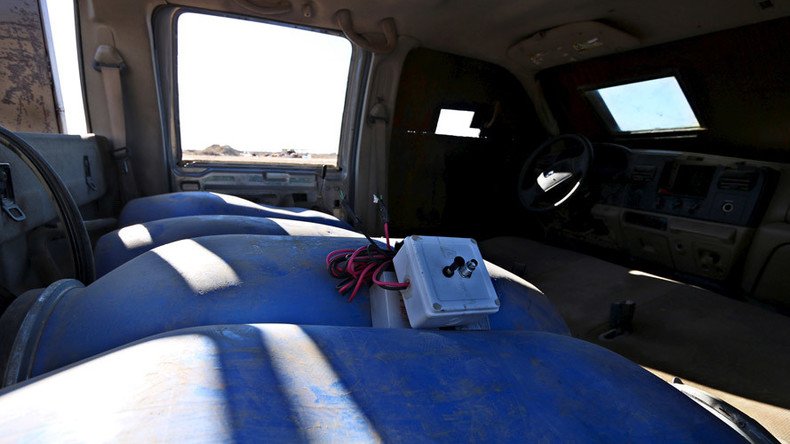20 countries involved in IS bomb supply chain, Turkey 'key choke point' – study

Over 50 companies from 20 countries, including Turkey, US and the Netherlands, have produced, sold or received hundreds of components, such as detonators, cables and wires, used by Islamic State terrorists to build improvised explosive devices (IEDs), a major study has found.
Islamic State (IS, formerly ISIS/ISIL) militants have manufactured and deployed IEDs across the battlefield on a "quasi-industrial scale," Conflict Armament Research (CAR), which undertook the 20-month study, stated in the report. Made of cheap and readily available components, IEDs appear to have become IS’s "signature weapon," the European Union-mandated study has found.
#ISIS easy to defeat if #Turkey and #SaudiArabia did not support it – Assad’s adviser to RT https://t.co/JY5GJCdSCZpic.twitter.com/ND8VdtlBrO
— RT (@RT_com) 25 февраля 2016 г.
The 107-page report said that many components that can be used in the manufacture of homemade explosives, such as aluminum paste and urea are actually not subject to transfer controls, including export licensing. As a result, their supply within the region is basically unregulated and weakly monitored. Other key components, such as detonators and detonating cord, are subject to export licensing, but are also commonly used in commercial activities, such as mining and industry. "Licensing alone has not been sufficient to prevent acquisition by IS forces," the research bureau said, adding that IS’s acquisition networks draw most heavily on lawful commerce in the countries that border their territory.
"Proximity is a major reason why the goods traded by Iraqi and Turkish companies appear throughout the supply chains of components that IS forces use to manufacture IEDs. Both Iraq and Turkey have large agricultural and mining sectors, in which many such chemicals and explosive components are employed extensively. At the same time, many small-scale commercial enterprises appear to have sold, whether wittingly or unwittingly, components to parties linked to, or employed by, IS forces," the study said.
A total of 13 Turkish firms were found to be involved in the supply chain. "With 13 companies involved in the supply chain, Turkey is the most important choke point for components used in the manufacture of IEDs by IS forces. These components include chemical precursors, containers, detonating cord, cables, and wires, which Turkish companies either manufactured or sold in Turkey before IS forces acquired them in Iraq and Syria," the report said.
ISIS shifting its focus from Iraq & Syria, goes on recruitment drive in Libya https://t.co/B854Er6lxUpic.twitter.com/nKFi151I41
— RT (@RT_com) 24 февраля 2016 г.
The Turkish government has refused to cooperate with CAR's investigation, James Bevan, CAR's executive director, told Reuters, so the group couldn't determine the efficacy of Ankara's regulations regarding the tracking of components.
"These findings support growing international awareness that IS forces in Iraq and Syria are very much self-sustaining — acquiring weapons and strategic goods, such as IED components, locally and with ease," Bevan stated.
The study also found that Islamic State militants were able to acquire IED components at an incredible speed. "The appearance of these components in possession of IS forces, as little as one month following their lawful supply to commercial entities in the region, speaks to a lack of monitoring by national governments and companies alike. It may also indicate a lack of awareness surrounding the potential use of these civilian-market components by terrorist and insurgent forces."
The components were recovered during major battles around the Iraqi towns of al Rabia, Kirkuk, Mosul, and Tikrit and the Syrian town of Kobani. CAR gained access to the components through partners, including Kurdish YPG in Syria, the Iraqi Federal Police, the Kurdistan Region Security Council and forces of the Kurdistan Regional Government.
'Washington is telling Ankara: NATO will not rescue you in Syria’ (Op-Ed) https://t.co/SdAHyBDMTZpic.twitter.com/CAwKbdkF61
— RT (@RT_com) 23 февраля 2016 г.
The report has also found that IS forces consistently employed the same electronic components in the construction of one type of remote-controlled IED used in Iraq. "Companies headquartered in Japan, Switzerland, and the United States manufactured the microcontrollers and transistors used in the devices."
Seven Indian companies manufactured most of the detonators, detonating cord, and safety fuses documented by CAR's field investigation teams. "Under Indian law, transfer of this material requires a license. All components documented by CAR were legally exported under government-issued licenses from India to entities in Lebanon and Turkey," the report said.
The report's authors said they attempted to contact the companies linked to the components, adding the firms did not respond or were not able to account for where the goods went after they left their custody. Companies from Brazil, Romania, Japan, Russia, China, Switzerland, Austria and Czech Republic were also involved, the report stated.












